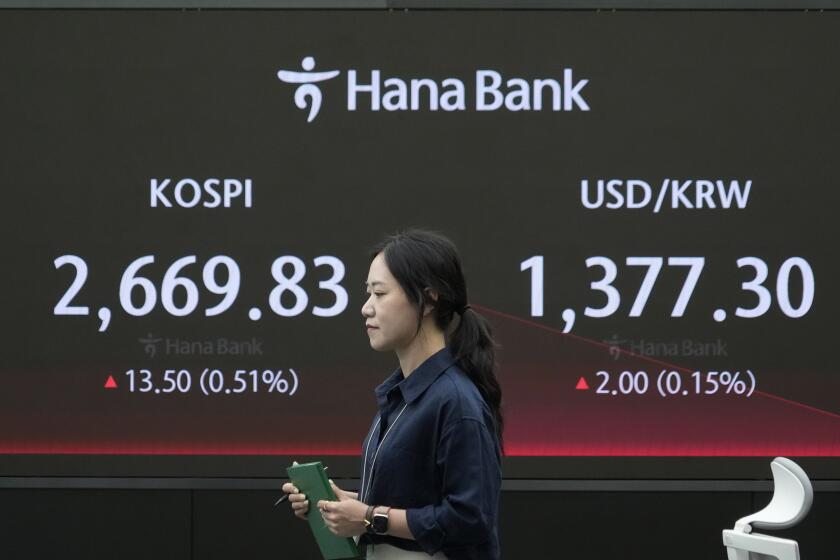Google Music debuts as sales battle with Apple, Amazon begins
Amid a colorful crowd of hipsters and music executives, Google Inc. unveiled its long-awaited digital Google Music store at the Hollywood studio of the street artist Mr. Brainwash.
New York indie band Monogold and rap artist Busta Rhymes held court Wednesday afternoon at the invitation-only audience as Google unveiled a library of 8 million songs available for download, from a collection that will soon grow to 13 million.
“Google Music is now open for business,” said Jamie Rosenberg, Google’s director of digital content and strategy.
Capping a year-long effort to forge partnerships with major record companies, Google took the wraps off an online store that will sell songs provided by Universal Music Group, EMI Group, Sony Music Entertainment and Merlin Network. Conspicuously missing from the lineup is Warner Music Group, which is still wrestling with Google over pricing. Warner’s catalog represents 20% of the world’s music inventory.
Google’s online store represents a full-scale assault on Apple’s wildly successful iTunes program and, to a lesser extent, Amazon’s growing online music sales. Like Apple, Google Music will price songs from about 99 cents a track up to about $10 for an album. About 20,000 songs are available for free. But unlike most music sites, it will also allow those who buy songs to share their music with friends, who will be able to listen to the entire song or album once in a try-before-you-buy fashion. Most other download stores offer only 30-second samples.
Among Google’s innovations: T-Mobile customers with Android phones can buy music without entering any payment information. Instead, they are charged for downloads on their cellphone bills. (Google executives estimate there are 200 million Android phone users in the U.S.)
Also, Google announced the creation of Artist Hub, a service for unsigned bands that want to build a storefront in Google’s music store. After paying a one-time $25 fee, bands can build a Web page and start selling tracks — and can sell tracks directly from their YouTube pages.
Google’s music partners applauded the moves.
“We expect this to be a rich new revenue stream for our artists,” said Rob Wells, president of Universal Music’s global digital business.
The new service may also combat illegal downloading.
“Any new legitimate place to consume music is a fantastic anti-piracy tool,” Wells said.
The gala opening is part of Google’s broader strategy to maintain its grip on a worldwide online audience that has migrated beyond computers, where the technology giant’s search engine dominates, to tablets and smartphones.
Key to that strategy is content. As mobile devices become the next contested field for consumers’ eyes and minds, tech companies such as Google have come calling on the entertainment industry to provide the music, movies and books necessary to attract consumer interest.
“Content is today’s battleground,” said Russ Crupnick, a music analyst with NPD Group, a market research firm. “That’s because the thing that drives sales of devices is the content. It’s less about the music, and more about wanting to own the entertainment experience on these technology platforms.”
Google has struggled in its often-contentious negotiations with movie and television studios to license content for its Google TV platform, which uses the Internet to pipe on-demand videos directly to TV sets. It struggled with its new music partners too. EMI, Sony, Universal and Merlin completed their agreements with Google only days before the Wednesday launch.
Google’s challenges are just beginning, analysts said. The technology giant must compete against formidable foes such as Apple Inc. and Amazon.com Inc. Apple’s iTunes accounts for 70% of the market for digital song downloads, according to NPD; Amazon has 14% of the market.
“The bar in this field is high,” said Mike McGuire, a digital media analyst with Gartner Inc. “Amazon and iTunes are really good at taking our money.”
Google has had little experience as a retailer, but the company
has considerable resources. It pulls in roughly $30 billion in annual revenue, predominantly from advertising, and has a war chest of $43 billion in cash and short-term investments.
It’s also the dominant online search engine, with more than 65% market share, according to ComScore, a firm that measures online activity.
“The traffic Google generates is unparalleled,” said NPD’s Crupnick. “Between YouTube, Android and the audience they have from search, this is shaping up to be one of the most important announcements for the music industry so far this year.”






